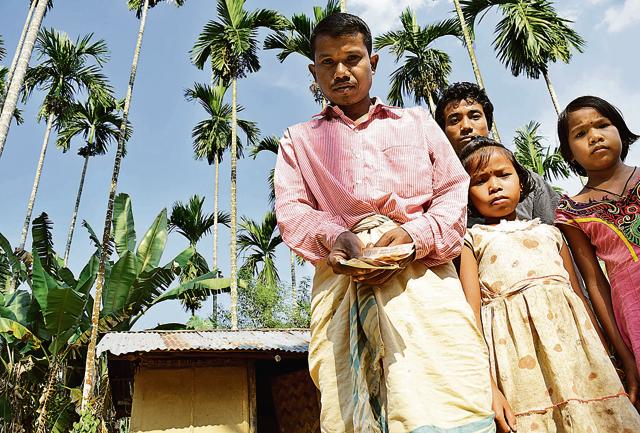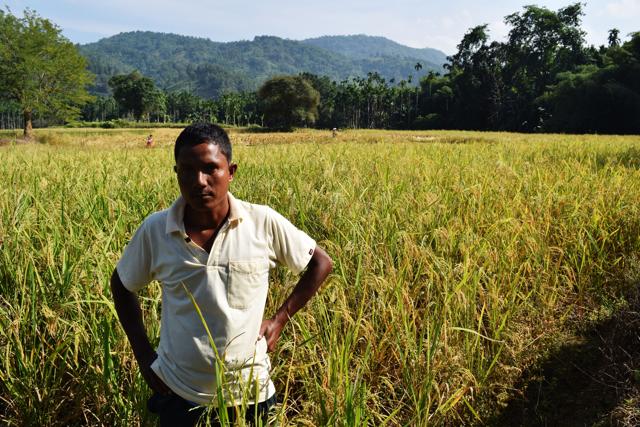Oranges for sugar and salt: Using the barter system to beat the cash crunch
In the North east, shortage of banks and ATMs is affecting people badly
There are two sides to living on the border. One, you get the best of both worlds – in the case of Babul Rabha, a market for his farm produce in Assam and Meghalaya. And two, you are neither here, nor there. The second is often dictated by external factors, like when the fire of an inter-tribe conflict farther west along the Assam-Meghalaya border singed Jimirigaon in December 2011, or when cash suddenly “becomes a cow that does not give milk”.

A decade ago, when Jimirigaon, about 70 km west of Assam’s principal city Guwahati, was electrified, Babul had touched a live wire out of curiosity. It was a jotka (shock) milder than what hit him a day after Prime Minister Narendra Modi announced demonetisation of high-value banknotes. He would perhaps have taken longer to get the news – mobile phone connectivity is erratic – had it not been Wednesday, when the weekly market is held at Baganbazaar, 14 km towards Guwahati.
Read:Currency ban: Only one-third have bank access; NE, backward regions worst hit
“The traders told me the three Rs 500 notes I took along to buy provisions are useless. People were discussing money more than spending it. The Rs 80 that I spent on a Tata Sumo from my village to the bazaar and back, was a waste of money. But I was prepared for the Saturday market at Modoki (on Meghalaya border),” Babul, 40, said.

Babul did what his forefathers used to – barter farm produce for essentials. And he thanked god that the “poisa (money) problem” happened when the oranges he grows on a 1.5-acre hump were beginning to ripen. He loaded two sacks full of oranges and traded them for pulses, sugar and salt, the exchange rate fixed at Rs 300 for 80 oranges.
Babul and most of some 150 inhabitants of Jimirigaon have a bank account, but they prefer keeping money at home because of the distances they have to travel. The nearest nationalised bank is at Loharghat, which is 25 km away, and it caters to more than 20,000 people in some 30 villages around. Besides, Jimirigaon suffers the ailment of a village disputed by two states; its link to the world beyond is a 3 km dirt track that has not been metalled because of objection from adjoining Meghalaya.

Babul’s neighbour Matiram Rabha, a 41-year-old paddy farmer, was fortunate to have deposited Rs 12,000 – his earning in the past six months – in his account before the demonetisation bomb exploded. “The only grocery shop in the village has remained closed since that day, and I do not fancy using up whatever I have in fares to buy a packet of tea or biscuit,” he said.
Diganta Das, a mason assigned by the Rabha tribal council to build a clubhouse at Jimirigaon, wants to take the first vehicle home 35 km away. But taking a break depends on how early he gets paid for the work done. “I am stuck here as long as they do not get the new cash for payment,” he said.
Read:Demonetisation leaves lakhs of tea, jute workers in Bengal, Northeast unpaid
At Umsur nearby, Banalata Rabha has had to be the ‘man’ of the house after her husband Jayanta fell from a tree on November 15, the day she realised they could wait no longer to change the Rs 10,000 they had at home. And as luck would have it, an uncle had to be admitted in a Guwahati hospital that day for a surgery. “Fortunately, a relative stood in queue and got the money changed in time for their treatment,” she said.

Kunjalata Rabha, a health worker without a debit card, never felt so helpless. “I am used to meagre amounts, but I do not have the change now to go to Azara (50km away) for a five-day training at the first referral unit there. I cannot afford to miss this training, so I borrowed coins from villagers for the fare,” she said.
Banks too are handing out coins to account holders, particularly to residents of remote villages such as Hangrum, 85 km from the nearest commercial centre in central Assam’s Dima Hasao district. “People are appreciating the coins as their needs are not much,” SBI official GS Das said.
The scenario is more grim across the tea-growing belts of eastern Assam where plantation workers have for 170 years been receiving weekly payment in cash. Now the planters are submitting cheques to the district administration and getting cash in return so that they can pay their workers. The ‘desperate measure for desperate times’ has helped avert labour unrest. But workers of a couple of estates where payment is credited to bank accounts are facing difficulties in withdrawing cash, following the shortage of currency of lower denominations.

The plains of Assam, though, are better off compared to landlocked districts of the hill states – such as Lawngtlai in Mizoram and Mechukha in Arunachal Pradesh – in the northeast. Mechukha, the sub-divisional headquarters of West Siang district, has no ATM and cash takes time to travel to the lone SBI from district headquarters Aalo, which is 190 km away.
Read:In rural UP, demonetisation causes ‘temporary pain’ but draws support
Work took Tachuk Padu from Aalo to Mechukha on November 8. Armed with a few Rs 500 notes, he was feeling rich enough to stay on for more than he needed to. “In one stroke, I became a poor man; the passenger SUVs would not let in,” he said.
The Mechukha-Aalo fare per passenger is Rs 500, an amount perhaps as difficult to cough up post-demonetisation as the Rs 50 for a trip from Umsur to Azara on the south-western fringes of Guwahati.
Get Current Updates on India News, Lok Sabha Election 2024 live, Infosys Q4 Results Live, Elections 2024, Election 2024 Date along with Latest News and Top Headlines from India and around the world.




